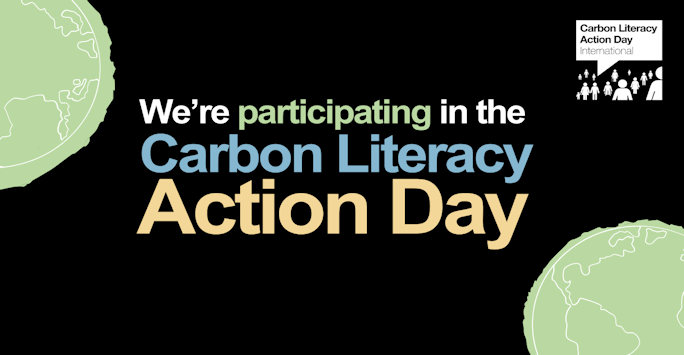
Today we are celebrating Carbon Literacy Action Day, highlighting the University’s dedication towards tackling climate change through education, and commitment to inspiring learners to work towards a zero-carbon future.
The third annual Carbon Literacy Action Day is The Carbon Literacy Project’s largest climate education-and-action training day, taking place today (4th December 2023), coinciding with COP28 - the UN Conference of the Parties.
It is the largest mass training event of its kind, where learners from all walks of life, sectors, genders, ages and nations all around the world, will participate in and complete their days’ worth of Carbon Literacy training simultaneously, to become certified as Carbon Literate. As part of their training day, learners make pledges to reduce their own carbon footprints, using their developed understanding of climate change to take action in both their personal and professional lives.
What is Carbon Literacy?
Carbon Literacy provides the knowledge, skills and motivation required to create a positive shift in how we live, work and act in response to the climate crisis. Becoming Carbon Literate means…
- Developing a greater understanding of the climate crisis and your footprint.
- Understanding the different ways in which you can reduce your carbon footprint as an individual, organisation or community.
- Creating a positive change in your life, organisation, or community.
- Developing a strong understanding of the impacts of climate change on the wider world and understanding climate injustice.
- Working to create lasting change and hope for all.
Carbon Literacy pilot
In the University’s Climate Plan, we have committed to developing a staff training and support programme, building knowledge and capacity, including carbon literacy and wider sustainability, from induction and beyond.
A small, local pilot was recently carried out with sustainability colleagues to assess the current landscape of carbon literacy training and to evaluate different carbon literacy providers, before rolling out to the university community.
View this post on Instagram
The training providers that were selected for evaluation were EAUC, IEMA, UN PRIME and the Carbon Literacy Project. Each of these providers brings a distinct approach and curriculum to the realm of carbon literacy education, and were chosen based on their reputation and their potential to meet the University’s needs.
EAUC was the main carbon literacy provider evaluated and the most popular choice. Participants engaged with the two-session course, which is a blended learning experience, with self-study elements alongside virtual training, and is relevant climate change learning for everyone. It is a great way to gain a solid awareness of climate change, and the climate impacts of our everyday actions. The engaging and interactive training allows delegates to map their own carbon footprint and gain an understanding and motivation to reduce personal and work-place emissions.
The Carbon Literacy Project offers a variety of course from ‘carbon literacy for individuals’, ‘carbon literacy for professionals’, ‘carbon literacy at work’, which all consist of a presentation along with group discussion, videos, quizzes, and games. In addition, two hours of home-based activity is required to complete the course. At the end of the course, there is opportunity to create your own Carbon Literacy course for your organisation or audience.
IEMA states that adapting businesses and industries to meet the climate change challenge requires new ways of working and significant upskilling. The aim of their one-day course is to provide the learner with a practical introduction to Environmental Sustainability so they are equipped with the knowledge, understanding and motivation to make a positive difference within their organisation. The course is designed for those working in any role across all sectors, to ensure that environmental sustainability is embedded into the operations of the company. No prior environmental knowledge is required.
UN PRME offers carbon literacy training for educators, communities, organisations, and students to equip participants with the information and skills needed to make high impact changes in social and professional life, for example influencing research, teaching, strategy, or consultancy work in order to reduce carbon emissions along with addressing multiple other Sustainable Development Goals. A certificate is awarded upon full participation across four weeks and completion of the individual project, issued by The Carbon Literacy Project.
The Strategic Change Department also piloted an in-person carbon literacy training session delivered by a Carbon Literacy Project trainer.
The evaluation of different carbon literacy providers has provided valuable insights, with all providers playing a pivotal role in shaping our collective response to climate change.
Next steps
The pilot was an important exercise which will help us to make informed decisions and develop effective strategies to address the challenges of climate change. By incorporating carbon literacy into decision-making processes, the University is taking a proactive step towards sustainability and environmental responsibility.
Plans are now underway to roll out sustainability training across the University, to encourage members of staff to consider the impact of their activities on carbon emissions and equip them with the knowledge and tools to reduce their carbon footprint.
Find out more
Staff interested in developing their carbon literacy can visit our recommended providers for course schedules and package details below:
- The Environmental Association for Universities and Colleges (EAUC)
- The Carbon Literacy Project
- Institute of Environmental Management & Assessment (IEMA)
- The Principles for Responsible Management Education (PRME)
Students interested in learning more about sustainability can complete the University's ‘Sustainability in Action’ online course and receive HEAR accreditation.